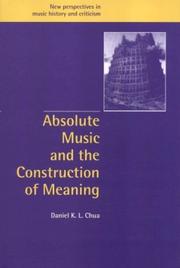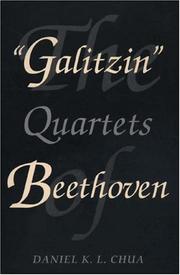| Listing 1 - 5 of 5 |
Sort by
|

ISBN: 0521631815 0521027519 0511089015 1107115698 0511019181 0511175752 0511156340 0511325401 0511481691 1280420294 0511051069 9780511481697 9780511019180 0511035829 9780511035821 9780511051067 9780511156342 9786610420292 6610420297 9780521631815 Year: 1999 Volume: *1 Publisher: Cambridge Cambridge University Press
Abstract | Keywords | Export | Availability | Bookmark
 Loading...
Loading...Choose an application
- Reference Manager
- EndNote
- RefWorks (Direct export to RefWorks)
This book is born out of two contradictions: first, it explores the making of meaning in a musical form that was made to lose its meaning at the turn of the nineteenth century; secondly, it is a history of a music that claims to have no history - absolute music. The book therefore writes against that notion of absolute music which tends to be the paradigm for most musicological and analytical studies. It is concerned not so much with what music is, but with why and how meaning is constructed in instrumental music and what structures of knowledge need to be in place for such meaning to exist. From the thought of Vincenzo Galilei to that of Theodore Adorno, Daniel Chua suggests that instrumental music has always been a critical and negative force in modernity, even with its nineteenth-century apotheosis as 'absolute music'.
Music --- Absolute music --- Absolute muziek --- Musique absolue --- Absolute music. --- Musique pure --- Musique --- Philosophy and aesthetics --- Philosophie et esthétique --- Philosophy and aesthetics. --- Hermeneutics (Music) --- Musical aesthetics --- Aesthetics --- Music theory --- Abstract music --- Philosophy --- Muziekfilosofie --- Muziekesthetica

ISBN: 0691044031 1306984378 0691607931 1400864208 9781400864201 9780691044033 9780691607931 Year: 2014 Publisher: Princeton, NJ
Abstract | Keywords | Export | Availability | Bookmark
 Loading...
Loading...Choose an application
- Reference Manager
- EndNote
- RefWorks (Direct export to RefWorks)
This study is an analysis of the first three of Beethoven's late quartets, Opp. 127, 132, and 130, commissioned by Prince Nikolai Galitzin. The five late quartets, usually considered as a group, were written in the same period as the Missa solemnis and the Ninth Symphony, and are among the composer's most profound musical statements. Daniel K. L. Chua believes that of the five quartets the three that he studies trace a process of disintegration, whereas the last two, Opp. 131 and 135, reintegrate the language that Beethoven himself had destabilized.Through analyses that unearth peculiar features characteristic of the surface and of the deeper structures of the music, Chua interprets the "Galitzin" quartets as radical critiques of both music and society, a view first proposed by Theodore Adorno. From this perspective, the quartets necessarily undo the act of analysis as well, forcing the analytical traditions associated with Schenker and Schoenberg to break up into an eclectic mixture of techniques. Analysis itself thus becomes problematic and has to move in a dialectical and paradoxical fashion in order to trace Beethoven's logic of disintegration. The result is a new way of reading these works that not only reflects the preoccupations of the German Romantics of that time and the poststructuralists of today, but also opens a discussion of cultural, political, and philosophical issues.Originally published in 1995.The Princeton Legacy Library uses the latest print-on-demand technology to again make available previously out-of-print books from the distinguished backlist of Princeton University Press. These editions preserve the original texts of these important books while presenting them in durable paperback and hardcover editions. The goal of the Princeton Legacy Library is to vastly increase access to the rich scholarly heritage found in the thousands of books published by Princeton University Press since its founding in 1905.
opus-127 --- 513 --- Muziekanalyse - vormleer --- String quartets --- Analysis, appreciation. --- Beethoven, Ludwig van, --- Beethoven, Ludwig Van --- Analysis, appreciation --- 526.30 --- Genre- en werkbesprekingen --- Beethoven, Ludwig van
Book
ISBN: 9780199769322 019976932X Year: 2017 Publisher: New York, NY Oxford University Press
Abstract | Keywords | Export | Availability | Bookmark
 Loading...
Loading...Choose an application
- Reference Manager
- EndNote
- RefWorks (Direct export to RefWorks)
By exploring the musical philosophy of Theodor W. Adorno through a wide range of the composer's music, 'Beethoven and Freedom' arrives at a markedly different vision of freedom. Author Daniel KL Chua suggests that a more human and fragile concept of freedom can be found in the music that has less to do with the autonomy of the will and its stoical corollary than with questions of human relation, donation, and a yielding to radical alterity. Chua's work makes a major and controversial statement by challenging the current image of Beethoven, and by suggesting an alterior freedom that can speak ethically to the twenty-first century.
Liberty in music --- Beethoven, Ludwig van, --- Criticism and interpretation.
Book
ISBN: 9780198846550 019884655X 0192585703 Year: 2021 Publisher: Oxford Oxford University Press
Abstract | Keywords | Export | Availability | Bookmark
 Loading...
Loading...Choose an application
- Reference Manager
- EndNote
- RefWorks (Direct export to RefWorks)
"Theology, Music, and Modernity has arisen from a collaboration between Duke University and Yale University. It addresses the question: how can the study of music contribute to a theological reading of modernity? It has grown out of the conviction that music has often been ignored in narrations of modernity's theological struggles. Written by an international team of distinguished theologians, musicologists, and music theorists, these essays show how music (and discourse about music) has remarkable powers to bring to light the theological currents that have shaped modern culture. It focuses on the concept of freedom, concentrating on the years 1740-1850, a period when freedom-especially religious and political freedom-became a burning matter of concern in virtually every strata stratum of Western society. The book is divided into four sections, each section focusing on a key phenomenon of this period- - the rise of the concept of 'revolutionary' freedom, the move of music from church to concert hall, the cry for eschatological justice in the work of black hymn-writer and church leader Richard Allen, and the often fierce tensions between music and language. There is a particular concern to draw on a distinctively 'Scriptural imagination' (especially the theme of New Creation) in order to elicit the key issues at stake, and to suggest constructive ways forward for a contemporary Christian theological engagement with the legacies of modernity today"--
Music --- Religious aspects --- Christianity --- History --- Art music --- Art music, Western --- Classical music --- Musical compositions --- Musical works --- Serious music --- Western art music --- Western music (Western countries) --- Religious aspects&delete& --- Christianity&delete& --- 78 --- 246.8 <09> --- 246.8 <09> Religieuze muziek--Geschiedenis van ... --- Religieuze muziek--Geschiedenis van ... --- 78 Muziek --- Muziek --- 78 Music --- Religieuze muziek--Geschiedenis van --- Music - Religious aspects - Christianity - History
Book
ISBN: 9781942130536 1942130538 Year: 2021 Publisher: New York Zone Books
Abstract | Keywords | Export | Availability | Bookmark
 Loading...
Loading...Choose an application
- Reference Manager
- EndNote
- RefWorks (Direct export to RefWorks)
In 1977 NASA shot a mixtape into outer space. The Golden Record aboard the Voyager spacecraft contains world music and sounds of the Earth with which humanity represents itself to any extraterrestrial civilizations. This book asks the big questions that the Golden Record raises. Can music live up to its reputation as the universal language in communications with the unknown? How do we fit all of human culture into a time capsule that will barrel through space for tens of thousands of years?
| Listing 1 - 5 of 5 |
Sort by
|

 Search
Search Feedback
Feedback About UniCat
About UniCat  Help
Help News
News